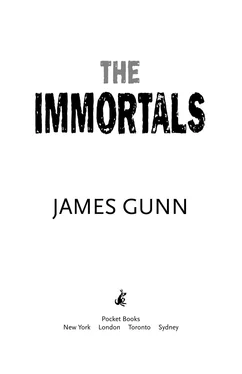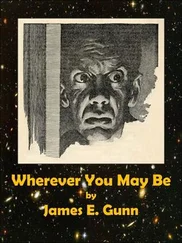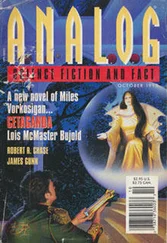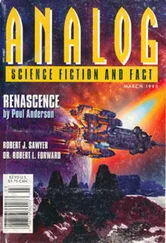“Stupidity!” Flowers turned to leave.
“Wait, boy,” Russ whispered. “Come here a moment.”
Flowers turned and walked to the old man’s chair; he looked down at Leah and back to Russ. The old man held out his hand, palm up. Automatically Flowers put out his hand to meet it, let his hand rest upon it. As the hands met, Flowers felt a curious sensation, almost electrical, as if something had stimulated a nerve into sending a message up his arm to his brain and carrying an answer back.
Russ’s hand dropped back limply. He lowered his head wearily against the back of the chaise lounge, his eyes closed. “A good man, Leah, troubled but sincere. We might do worse.”
“No,” Leah said firmly, “he must not come here again. It wouldn’t be wise.”
“Don’t worry about that,” Flowers said. He wouldn’t be back; he hadn’t felt like this since he was a little boy listening to his father tell him about medicine.
“Some empty time,” Russ said distantly, “you might think of this, a conclusion I reached many years ago: There can be too many doctors and not enough healers.”
Leah rose gracefully from the floor. “I’ll see you to the door.”
Her unconscious use of the phrase brought pity chokingly into Flowers’s throat. It was a tragedy because she was beautiful—he thought of her now as beautiful—and peacefully beautiful inside. Reporting her was going to be painful.
He wondered how his hand had felt to her: hot, sweaty, nervous? How had he seemed to her?
He paused at the outside door. “I’m sorry I couldn’t help your grandfather.”
“He’s not my grandfather—he’s my father. I was born the year he was one hundred. He wasn’t old then. He was middle-aged, everyone thought. It’s only these last few months he’s grown old. I think it’s a surrender we make when we grow very tired.”
“How do you live—with him sick, and—”
“And me blind? People are generous.”
“Why?”
“They’re grateful, I suppose. For the times when we can help them. I collect old remedies from grandmothers and make them up; I brew ptisans; I’m a midwife when I’m needed; I sit up with the sick, help those I can, and bury those I can’t. You can report this, too, if you wish.”
“I see,” Flowers said, turning away and swinging back, irresolute. “Your father—I’ve seen him somewhere. What’s his name?”
“He lost it more than fifty years ago. Here in the city, people call him healer.” She held out her hand toward him. Flowers took it reluctantly. This was the end of it. The hand was warm; his hand remembered the warmth. It would be a good hand to hold if you were sick.
“Goodbye, Medic,” she said. “I like you. You’re human. So few of them are. But don’t come back. It wouldn’t be good for any of us.”
Flowers cleared his throat noisily. “I said I wouldn’t,” he said; even to him it sounded petulant and childish. “Goodbye.”
She stood in the doorway as he turned, shifted the bag into his right hand, and picked his way down the porch stairs. It was a good bag, and it felt solid in his hand. It was on semipermanent loan from the Center. Against its black side were two words imprinted in gold: BENJ. FLOWERS. Someday there would be two more letters added: M.D.
A few months more and he would have earned them; he would buy the bag, make a down payment on his library, pass the state examination. He would have a license from the state to practice medicine upon the bodies of its citizens. He would be a doctor.
For the first time since he could remember, the prospect didn’t excite him.
A man was lying almost under the front wheel of the ambulance. Beside him, on the broken pavement, was a crowbar. Flowers rolled the man over. His eyes were closed, but he was breathing easily. He had got too close and the supersonics had knocked him out.
He should call the police about this, too, but he felt too tired for another battle with the police.
He pulled the body out of the path of the wheels and opened the ambulance door. There was a whisper of movement behind him.
“Medic!” Leah screamed. Her voice was distant and frightened.
Flowers started to turn, but it was too late. The night came down and covered him.
* * *
He opened his eyes to darkness, and the thought was instantaneous: This is what it is to be blind. This is what Leah knows always.
His head throbbed. There was an egg-sized lump on the back of it, where someone had hit him. The hair was matted with dried blood. He winced as his fingers explored the depth of the cut, but it wasn’t too bad. He decided that there was no concussion.
He didn’t feel blind. Probably there was no light.
He had a faded, uncertain memory—as of something lost in childhood mists—of a wild ride through city streets; of a heavy door that swung upward, clanging; of an entrance into a place cavernous, musty, echoing; of being carried—on what? the ambulance stretcher?—up a short flight of stairs, through something awkward, up more steps, down dark halls, and being lowered to the floor.
Someone had said something. “He’s coming around. Shall I tap him again?”
“Never mind. Just roll him out until we need him. He won’t go anywhere.”
Thump! Blackness again.
* * *
Concrete was under him, cold and hard. He got to his feet, feeling shaky, aching all over, not just his head. He took a cautious step forward, and another, holding one hand straight out in front, fingers extended, the other arm curled protectively over his face.
At the fifth step his fingers touched a vertical surface. Concrete again. A wall. He turned and moved along the wall to a corner and along a second wall that was shorter and had a door in it. The door was solid metal; it had a handle, but the handle wouldn’t turn. The other walls were unbroken. When he had finished the circuit, he had a mental picture of a windowless room about fifteen feet long by nine feet wide.
He sat down and rested.
Somebody had booby-trapped him, knocked him out, brought him to this concrete box, locked him in.
It could have been only one person. The man he had pulled from under the wheel. He had crept in close to the ambulance, so slowly that the detectors hadn’t reacted. When Flowers had come, they had clicked off, and the man had been released to club him. A crowbar might make a wound like that.
If he was a hijacker, if he had wanted the drugs and the instruments, why had he bothered to bring along the medic?
Flowers went through his pockets—futilely. The coat and the jacket underneath were empty. They had taken the needle gun.
He would hide behind the door, he decided. When it opened—he could tell from the hinges on this side that it opened inward—he would be behind it. He had fists. He was big enough; maybe he was strong enough. He would have a good chance of taking the hijackers by surprise.
Meanwhile, he sat in the dark silence, remembering the dream he had wakened from. It had seemed to him that he was a little boy again, and his father was talking to him in the grown-up fashion he had affected with his son. It had always embarrassed Flowers, even when he was very young.
“Ben,” his father said, “there may be more important things than medicine, but you can’t be sure of any of them.” He put his hand on the boy’s shoulder. It was heavy and Ben wanted to shrug it off, but he didn’t dare.
“It’s different with medicine. You deal with life, and life is always important. You’ll feel it every day, because every day you’ll have a personal fight with death, you’ll beat him back a foot, surrender a few inches, and come back to the battle. Because life is sacred, Ben. No matter how mean it is or crippled, it’s sacred. That’s what we bow down to, Ben. It’s the only thing worth worshipping.”
Читать дальше












